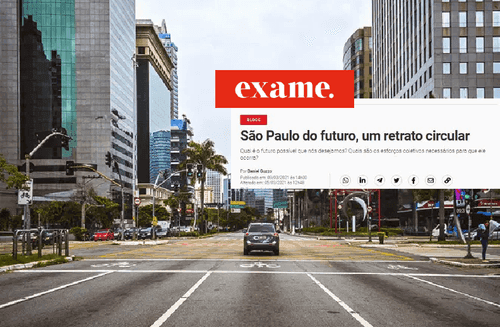
25/05/2021
Exame Magazine: São Paulo of the future
Translated by Google Translate
*This super cool text on circular economy was published on the Exame magazine portal and talks about the cities we want to build in the future. The article is signed by Daniel Guzzo, who is also a partner of the Circular Movement. Shall we together think about sustainable solutions for the future? *
By Daniel Guzzo, from Exame
One of the topics frequently addressed here on the blog is the evaluation of impact interventions. Counterfactual explorations serve to visualize potential developments of the changes. Based on this reasoning, I did an exercise of reflection and creation of a possible and desirable scenario for the future guided by the principles of Circular Economy. I try to imagine what the city of São Paulo would be like in a context in which innovations for the efficient and effective use of resources are encouraged and adopted. For that, I put myself in the shoes of a recyclable collector in 2041. The text is inspired by this vision of a circular city in Europe. The aim is to help think about points such as: What is the possible future that we want? What are the collective efforts required for it to occur? Good reading!
What will the cities of the circular future look like?
I am proud of the importance of our work. I say ours, because this craft goes beyond generations. We were already known as scavengers and we loaded carts with all our effort. Today, thanks to my parents, I can help keep the city clean with my tricycle - the electric tricycle we use to load stuff around. I remember the challenges of teaching my father to use a smartphone to access the recycling app and create a direct relationship with our suppliers. Yes, suppliers! It was hard to imagine that people called all that cardboard, plastic, aluminum and other precious materials garbage.
We, the circulators - we agree, much more suited to what we do - operate an extensive collection fleet with total traceability of the collected resources. We are directly connected to our customers on a digital reverse logistics platform. Our work is key for small, medium and large companies to achieve their recycling quotas. Today, we are more than 1 million circulators across the country. We have contributed a lot to implement all the goals of the National Circular Economy Act and surpass the 90% collection and recycling mark last year.
Since I was a child, I followed the great readaptation of the city with a focus on its local communities. Many today work close to their homes and several days at home office. This change made everything communal. It's all co. Paulistanos live in coliving, sometimes they work together in coworking and some even supplement their income by cooking in cokitchens.
As everything got closer, it is in people's daily lives to come and go with the shared orange bicycles. If the road is longer, we take a scooter or an electric car. It seems that we finally realized that we don't need to own everything we use. Being connected to the local community provides real community workshops and wardrobes. And we still know and interact with our neighbors. How not to participate? The “culture of sharing” leaves us connected. I think these were some of the great inheritances of the pandemic of the early 2020s. Difficult times for our family. Anyway...
On the banks of the metropolis, small producers of organic food mix with the suburbs, giving life to the ecosystem. This makes our table much healthier! At the beginning of each week, we receive a box of fresh, organic fruits and vegetables from the local producers at home. When I'm in a hurry or out of time to cook, I order those delicious marmites made by neighborhood cooks using fresh local vegetables. You need to have enough energy to make the resources flow!
The cycle of organic compounds is also closed, feeding back the productive belt and the extensive linear parks that emerged. I heard that this reality also occurs in the interior of the country, on forest farms! Part of what is produced there becomes plant-based meat. A delight! These spices help ensure food quality for much of the world. In addition, several of these forest farms have recovered land, rivers and biodiversity in various places in the Pantanal, the Amazon, the Cerrado and even in the Atlantic Forest. How I would like to know these places!
It was by respecting and mimicking the cycles of nature that we were able to help with the great challenges that arose: from the availability of resources to the climate crisis. The recycling of resources, sharing of products and the use of purer inputs are now part of everyday life. We sometimes wonder if we really need to have this or that product. We learned to value the efforts of those who direct resources in the right flows (thankfully!). Remember that we are part of nature's cycles was a necessary step to bring abundance to our daily lives. There is still a long way to go, but I feel that we are on the way.
Available content here

